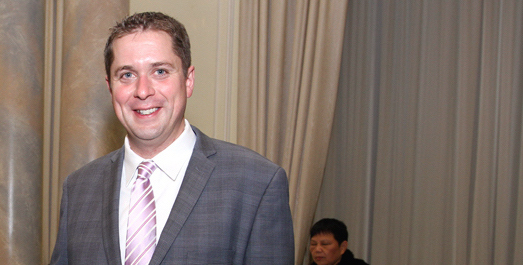Andrew Scheer had to go to the 13th ballot before winning the Conservative Party of Canada (CPC) leadership over Quebec MP Maxime Bernier by 51 per cent to 49 per cent.
Bernier had led every previous round of the voting.
Scheer, 37, was first elected to the House of Commons in 2004 at age 24.
He is Stephen Harper with a smile — that was the consensus media take on the Conservative pick for leader, announced in Toronto Saturday.
Unlike Harper, he is considered friendly, but not noted for his quick thinking or interest in policy questions.
Both Harper and Scheer worked for MPs before running for Parliament: Harper for Calgary Progressive Conservative James Hawkes; Scheer in the Regina constituency office of Larry Spencer of the Canadian Alliance (formerly Reform which eventually merged with the PCs to become the CPC).
Scheer is a practicing Roman Catholic, father of five children, and a “family values” social conservative, unsympathetic to reproductive rights, same-sex marriage, or transgender rights.
The months-long race was short a star candidate. On the first ballot, barely more than one out of five voters supported Scheer, while Bernier fell short of 30 per cent.
Party leaders with weak early-ballot support are thought to be less successful in general elections than those like Justin Trudeau who win outright on the first ballot.
Selling $15-memberships to potential voters worked out well for the Conservative Party of Canada. Party membership now stands at 240,000, up significantly.
Some 140,000 CPC members ranked the 13 official candidates from one to 10; and then took the trouble to mail in their ballots, appear at 13 voting stations organized across the country, or attend the Toronto convention where the results were announced.
On each round of preferential voting the candidate with the lowest number of votes was dropped off the ballot for the following round. Then the ranked ballots of the dropped candidate were apportioned to the remaining candidates.
Voting was not only by preferential ballot; it was weighted voting. Each riding was assigned an equal value of 100, irrespective of the number of voters in the riding.
Adding up the riding-by-riding results produced the dropped candidate for each ballot (the one with the lowest weighted vote).
Weighted voting should have helped the Quebec candidate Maxime Bernier. Instead of winning the 78 Quebec ridings by a vast majority Bernier conceded 44 per cent to Scheer, who had the active support of four of the 12 Quebec CPC MPs, plus the influential Quebec farm union Union des producteurs agricoles (UPA).
Following UPA direction, Quebec farmers organized to defeat Bernier, who had always supported supply management at election time, but came out as opposed to supply management in the leadership campaign as part of his libertarian economic stance.
Weighted voting favoured rural ridings. Farm income support programs are popular in rural Canada, and particularly in the Beauce region of Quebec, where Bernier is from.
While Bernier lost support in rural Quebec — including losing his own riding — Scheer gained support when the fourth-place finisher turned out to be from Saskatchewan like himself.
Scheer takes a fiscal stance that dates from the Ronald Reagan era, as was revealed in his acceptance speech.
In order to create prosperity, cut taxes, he intoned. Picking up a daily mantra from the Conservative backbenches in the Harper era, Scheer promised to eliminate a Liberal “jobs-killing carbon tax.”
Scheer pledged to end the big-spending government headed by Justin Trudeau. He said he did not want his children to grow up with a Canadian government going always deeper in debt, as it did under a Liberal government headed by Justin’s father, when Scheer was growing up.
Scheer served as Speaker of the House of Commons from 2011 to 2015, a position that puts loyalty to Parliament before loyalty to party.
As Speaker, Scheer was poor to terrible in his daily performance. He showed no ability to enforce the rules of parliamentary debate, allowing government members to bray away, while ministers routinely disrespected questioners.
The Conservative non-answer was the same tiresome attack on the questioner, repeated day after day, making a mockery of the institution of Parliament, with the complicity of its chief officer.
The Liberals are delighted to attack Scheer for his social conservative views. His first challenge will be to show he is up to the standard set by Rona Ambrose as interim CPC leader.
Duncan Cameron is former president of rabble.ca and writes a weekly column on politics and current affairs.
Photo: 中華民國外交部 MOFA, R.O.C. (Taiwan)/flickr
Like this article? rabble is reader-supported journalism. 



